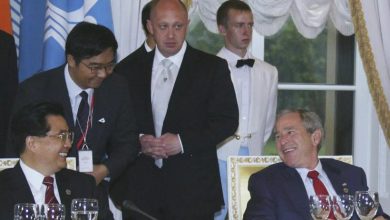ARE JAMES BOND MOVIES INSPIRED BY GEOPOLITICAL CHANGES..?

The world of James Bond movies is not just about action-packed adventures and suave spies; it is also intricately connected to the geopolitical changes that shape our world. These films have consistently reflected and responded to real-world events, incorporating themes of global politics, espionage, and evolving security concerns. From the Cold War era to the present day, the Bond franchise has adapted to remain relevant, capturing the spirit of the times and offering a captivating blend of fiction and reality. In this article, we delve into the fascinating relationship between James Bond movies and geopolitical changes, exploring how these films have been inspired by and mirrored significant global events.
Key Takeaways
- James Bond movies have been influenced by geopolitical changes throughout their history, adapting to reflect shifting global dynamics.
- The Cold War era provided the backdrop for the early Bond films, featuring Soviet agents and organizations as primary antagonists.
- Post-Cold War movies shifted focus to address emerging global threats such as terrorism, cybercrime, and the changing power balance.
- Bond films draw inspiration from real-world espionage scandals, incorporating elements of betrayal and internal conflicts within intelligence agencies.
- Technological advancements and their impact on global politics are reflected in the movies through cutting-edge gadgets, cyber threats, and surveillance techniques.
Geopolitical Context in James Bond Movies
The Cold War Era
The James Bond series was born during the height of the Cold War, a period characterized by intense political tension and rivalry between the United States and the Soviet Union. The first Bond film, “Dr. No,” released in 1962, showcased the espionage world’s atmosphere during this era. The movie’s plot revolves around Bond’s mission to investigate the disappearance of a British agent and uncovers a plot involving a mysterious organization in Jamaica.
The Influence of the Cold War on Bond’s Foes
Throughout the series, the Cold War provided a rich backdrop for Bond’s adversaries. Soviet agents and organizations with affiliations to communist regimes frequently emerged as the primary antagonists. Examples include the iconic villain Ernst Stavro Blofeld, head of the global criminal organization SPECTRE, which made appearances in multiple films.
Reflecting the Post-Cold War World
Following the end of the Cold War, the Bond films underwent a transformation to adapt to the new geopolitical landscape. The 1995 film “GoldenEye” reintroduced Bond to the post-Soviet era, with the plot involving the theft of a powerful satellite weapon by a former Soviet agent seeking revenge. This shift in focus showcased the changing dynamics of global power and the emergence of new threats beyond traditional Cold War tensions.
Terrorism and Global Security Concerns
As the world faced new challenges in the 21st century, Bond movies embraced the changing geopolitical landscape by incorporating themes of terrorism and global security concerns. The films highlighted the ever-evolving nature of threats faced by intelligence agencies and governments worldwide. For instance, in “Casino Royale” (2006), Bond confronts a financier affiliated with a terrorist organization, reflecting the growing emphasis on non-state actors and asymmetric warfare.
Technological Advances and Cybersecurity
Another aspect of geopolitical changes evident in James Bond movies is the influence of technological advances. As the world became increasingly interconnected, the films incorporated elements of cyber warfare, surveillance, and hacking. Skyfall” (2012) explored the vulnerability of intelligence agencies in the digital age, depicting the threat of a cybercriminal targeting British intelligence infrastructure.
Real-World Parallels
While the Bond films are fictional, they often draw inspiration from real-world events and trends. These parallels contribute to the series’ resonance with audiences and its ability to capture the spirit of the times.
Espionage and Espionage Scandals
Espionage has long been a part of international relations, and Bond films reflect this reality by featuring intricate spy networks and espionage scandals. The infamous Cambridge Spy Ring, involving British spies passing information to the Soviet Union during the Cold War, bears similarities to the internal conflicts and double agents portrayed in Bond movies.
Global Power Struggles
The geopolitical shifts in global power have shaped the themes and narratives of James Bond movies. The rise of new superpowers, such as China, and the ongoing rivalry between the United States and Russia continue to influence the franchise. Bond films often tap into these power struggles, incorporating them into the plotlines to create a sense of relevance and realism.
Security Concerns and Terrorism
The threat of terrorism and global security concerns has remained a pressing issue in the real world. Bond movies have consistently adapted to reflect this reality, showcasing the challenges faced by intelligence agencies and the need to address non-state actors. Real-world events, such as the 9/11 attacks and subsequent counterterrorism efforts, have undoubtedly influenced the portrayal of these themes in the films.
Technological Advancements
As technology continues to advance rapidly, so too does its influence on global politics. James Bond movies have mirrored this trend by incorporating cutting-edge gadgets, surveillance techniques, and cyber threats. Real-world incidents, such as high-profile cyberattacks and the debates surrounding privacy and surveillance, provide inspiration for the films’ portrayal of technological advancements.
FAQ
1. How have geopolitical changes influenced the portrayal of villains in James Bond movies?
In James Bond movies, geopolitical changes have played a significant role in shaping the portrayal of villains. With each era, the franchise has adapted to reflect the shifting geopolitical landscape. During the Cold War, Soviet agents and organizations affiliated with communist regimes were often depicted as Bond’s adversaries, reflecting the intense political tension of the time. In the post-Cold War era, the villains took on new forms, aligning with emerging global threats such as international terrorism and cybercrime. These changes in villains reflect the evolving geopolitical dynamics and allow the Bond movies to stay relevant and capture the fears and concerns of the audience.
2. How do James Bond movies reflect the impact of terrorism on global security?
James Bond movies have consistently reflected the impact of terrorism on global security concerns. The films often explore the ever-evolving nature of threats faced by intelligence agencies and governments worldwide. They depict the challenges of countering non-state actors and the complexity of asymmetric warfare. Bond movies address the consequences of terrorist activities, highlighting the need for intelligence cooperation, advanced surveillance techniques, and the use of technology to thwart such threats. By doing so, the films provide a platform to discuss and raise awareness about the real-world issue of terrorism and its implications for global security.
3. How do James Bond movies incorporate real-world espionage scandals?
James Bond movies draw inspiration from real-world espionage scandals to add depth and authenticity to their narratives. These scandals, such as the Cambridge Spy Ring during the Cold War, involve double agents and internal conflicts within intelligence agencies. Bond films explore similar themes of betrayal, infiltration, and the consequences of compromised security. By incorporating real-world espionage scandals, the movies create a sense of realism and credibility, enhancing the audience’s engagement and connection to the stories unfolding on screen.
4. How do James Bond movies reflect the changing dynamics of global power struggles?
The changing dynamics of global power struggles are often mirrored in James Bond movies. The rise of new superpowers, such as China, and the ongoing rivalry between the United States and Russia, influence the franchise. Bond films tap into these power struggles by incorporating them into the plotlines, showcasing the complex relationships between nations and their intelligence agencies. These narratives capture the audience’s attention and offer a glimpse into the ever-shifting balance of power in the real world.
5. How do James Bond movies address the impact of technological advancements on espionage?
Technological advancements play a crucial role in shaping the world of espionage depicted in James Bond movies. The films often feature cutting-edge gadgets, surveillance techniques, and cyber threats, reflecting the influence of technology on intelligence operations. They explore the vulnerabilities of intelligence agencies in the digital age, highlighting the potential risks of cyber warfare and the importance of cybersecurity. By addressing the impact of technological advancements, Bond movies provide a platform to discuss the evolving nature of espionage in an increasingly interconnected world.
6. How do James Bond movies depict the relationship between intelligence agencies and governments?
James Bond movies depict a complex and often strained relationship between intelligence agencies and governments. The films portray the tensions that arise when political agendas clash with the needs of intelligence operatives. Bond’s character often operates on the fringes, pursuing his own mission objectives while facing resistance and interference from higher authorities. These portrayals reflect the delicate balance between national security interests, diplomatic considerations, and the autonomy required for effective intelligence operations.
7. How do James Bond movies incorporate cultural and global diversity?
James Bond movies have made efforts to incorporate cultural and global diversity in their narratives. In recent years, the franchise has introduced more diverse characters, both in terms of ethnicity and nationality, to reflect the multicultural nature of the real world. The films have showcased different countries and cultures, highlighting the global reach of intelligence operations. This approach not only adds richness and authenticity to the storytelling but also fosters inclusivity by representing a broader range of perspectives and experiences.
8. How have James Bond movies evolved to reflect societal changes?
James Bond movies have evolved to reflect societal changes, adapting their narratives and characters to align with shifting norms and values. In recent films, there has been a greater emphasis on portraying stronger and more empowered female characters, moving away from the traditional “damsel in distress” trope. The franchise has also addressed social issues such as gender equality and representation, showcasing a more nuanced and inclusive approach. These adaptations demonstrate the movies’ responsiveness to changing societal expectations and their commitment to staying relevant in a rapidly evolving world.
9. How do James Bond movies balance fantasy and realism in their storytelling?
James Bond movies strike a delicate balance between fantasy and realism in their storytelling. While the films feature larger-than-life action sequences and extraordinary gadgets, they also ground their narratives in real-world contexts. The incorporation of geopolitical events, real-world threats, and references to actual espionage techniques adds an element of realism. However, the films also maintain an element of fantasy, allowing audiences to escape into a world of glamorous locations, high-stakes missions, and larger-than-life characters like James Bond himself.
10. How do James Bond movies contribute to the cultural perception of spies and intelligence agencies?
James Bond movies have had a significant impact on the cultural perception of spies and intelligence agencies. The franchise has shaped the image of the suave and sophisticated secret agent, establishing iconic elements such as the “007” code name and the character’s impeccable style. While the films present a fictionalized version of espionage, they contribute to the popular imagination surrounding spies and intelligence work. They often showcase the glamour and intrigue associated with the profession while also highlighting the dangers and sacrifices involved. Bond movies have become synonymous with espionage and have played a role in creating and perpetuating the cultural fascination with spies.
Conclusion
James Bond movies have not only entertained audiences worldwide but have also served as a mirror to the geopolitical changes unfolding in our world. From the Cold War to the present day, these films have captured the evolving landscape of global politics, adapting their narratives to reflect the concerns, fears, and power dynamics of different eras. By incorporating elements of real-world events, espionage scandals, and technological advancements, the Bond franchise has maintained its relevance and continued to captivate audiences. As we eagerly anticipate future Bond adventures, we can be sure that they will continue to provide thrilling escapism while offering a subtle reflection of the geopolitical changes that shape our world.









